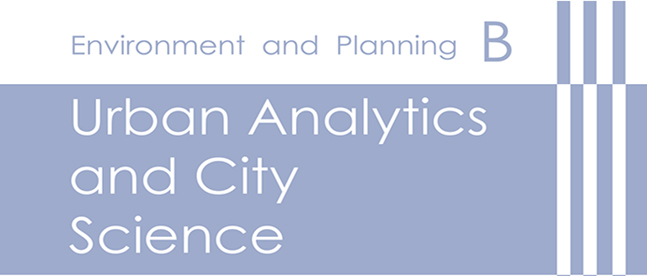ISSN (print): 2399-8083
ISSN (online): 2399-8091
Call of the Journal:
Dec
2020
Jan
2021
Apr
2021
May
2021
Rapid advances in Information and Communication Technologies (ICTs) and big data analytics are disrupting almost every aspect of the society. They are believed to help communities to deal with the global change challenges and to make advances towards achieving the Sustainable Development Goals (SDGs). ICTs are expected to shape the future of cities in many sectors such as building, energy, health, land use, transportation, and waste management. Accordingly, cities around the world increasingly adopt smart solutions enabled by advances in ICTs and big data analytics to address the challenges of global change and to create just, sustainable, and resilient communities. While a relatively vast body of research exists on the contributions of smart cities to sustainability and quality of life, modelling and empirical research on actual and potential contributions of smart cities to urban climate resilience is still limited. Cities are home to most of the world population and account for over 70% of global CO2 emissions. On one hand this indicates that a great potential for climate change mitigation exists in cities. On the other, it highlights the significance of building on urban resilience, as higher concentration of population and resources in cities may render them more susceptible to climate change impacts. It is increasingly argued that conventional strategies are not sufficient for addressing global change challenges. Instead, we need to develop disruptive solutions, enabled by ICTs and big data analytics, that provide innovative value propositions and facilitate transformative change. Such disruptive smart city solutions are essential for developing science-based measures, policies, and strategies that improve efficiency and efficacy of mitigation/adaptation efforts and enable cities to address the global change challenges and make progress towards climate-compatible cities that are low carbon and disaster resilient.
Against this backdrop and to address the above gaps, we encourage researchers and practitioners to submit original research articles, case studies and, review articles on topics including, but not limited to, the following: Exploiting IoT and big data analytics for climate-resilient urban planning; ICT-enabled solutions to accelerate progress on climate action in cities; Exploiting smart solutions for developing urban integrated assessment frameworks; Experimental and/or modeling evidence on the contribution of smart city solutions to climate change adaptation and/or mitigation; Methods and approaches for evaluating climate resilience contributions of smart cities; Contributions of mobility-related smart solutions (e.g., ridesourcing, mobility-as-aservice, autonomous vehicles, e-bikes, telecommuting etc.); Contributions related to energy systems (e.g., peer-to-peer electricity trading, electric vehicles-to-grid, time-of-use pricing, etc.); Sustainability, health, and equity co-benefits and trade-offs of smart solutions; Challenges and barriers that need to be addressed for mainstreaming data-driven and climate-resilient urban planning.
Smart Cities and Climate-Resilient Urban Planning
Rapid advances in Information and Communication Technologies (ICTs) and big data analytics are disrupting almost every aspect of the society. They are believed to help communities to deal with the global change challenges and to make advances towards achieving the Sustainable Development Goals (SDGs). ICTs are expected to shape the future of cities in many sectors such as building, energy, health, land use, transportation, and waste management. Accordingly, cities around the world increasingly adopt smart solutions enabled by advances in ICTs and big data analytics to address the challenges of global change and to create just, sustainable, and resilient communities. While a relatively vast body of research exists on the contributions of smart cities to sustainability and quality of life, modelling and empirical research on actual and potential contributions of smart cities to urban climate resilience is still limited. Cities are home to most of the world population and account for over 70% of global CO2 emissions. On one hand this indicates that a great potential for climate change mitigation exists in cities. On the other, it highlights the significance of building on urban resilience, as higher concentration of population and resources in cities may render them more susceptible to climate change impacts. It is increasingly argued that conventional strategies are not sufficient for addressing global change challenges. Instead, we need to develop disruptive solutions, enabled by ICTs and big data analytics, that provide innovative value propositions and facilitate transformative change. Such disruptive smart city solutions are essential for developing science-based measures, policies, and strategies that improve efficiency and efficacy of mitigation/adaptation efforts and enable cities to address the global change challenges and make progress towards climate-compatible cities that are low carbon and disaster resilient.
Against this backdrop and to address the above gaps, we encourage researchers and practitioners to submit original research articles, case studies and, review articles on topics including, but not limited to, the following: Exploiting IoT and big data analytics for climate-resilient urban planning; ICT-enabled solutions to accelerate progress on climate action in cities; Exploiting smart solutions for developing urban integrated assessment frameworks; Experimental and/or modeling evidence on the contribution of smart city solutions to climate change adaptation and/or mitigation; Methods and approaches for evaluating climate resilience contributions of smart cities; Contributions of mobility-related smart solutions (e.g., ridesourcing, mobility-as-aservice, autonomous vehicles, e-bikes, telecommuting etc.); Contributions related to energy systems (e.g., peer-to-peer electricity trading, electric vehicles-to-grid, time-of-use pricing, etc.); Sustainability, health, and equity co-benefits and trade-offs of smart solutions; Challenges and barriers that need to be addressed for mainstreaming data-driven and climate-resilient urban planning.
Clarivate Analytics: Current Contents – Social & Behavioral Sciences; Clarivate Analytics: Social Science Citation Index; EBSCOhost; PubMed: MEDLINE (selectively indexed); SCOPUS.
Info at: journals.sagepub.com/author-instructions/EPB#OpenAccess
Guest Editors
Ayyoob Sharifi
Yoshiki Yamagata










